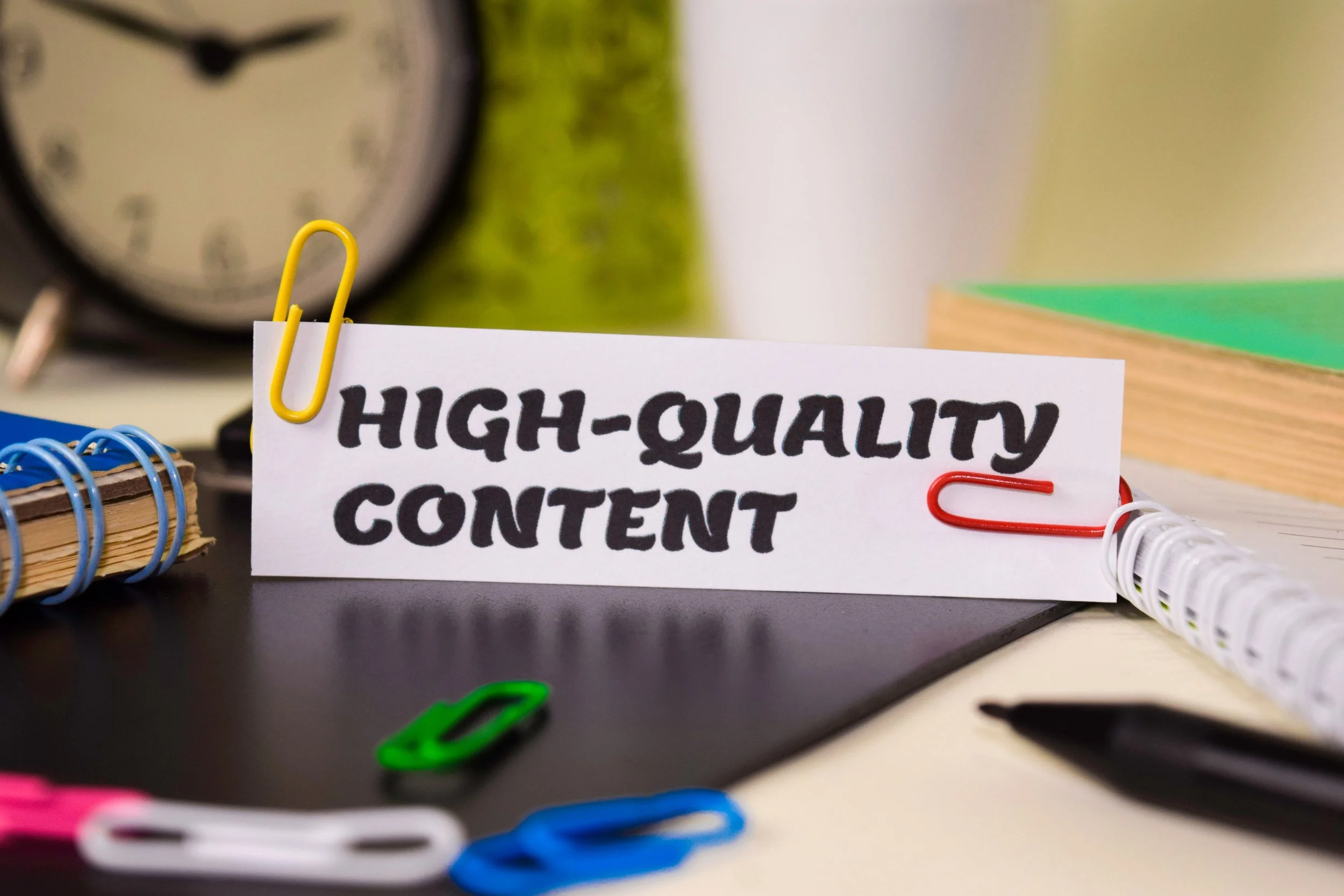B2B vs. B2C Content Marketing: How a Content Editor Can Help Your Small Business (and Boost Your Authority)
As a small business owner, you can appreciate the challenges of starting and running a business. At the beginning, you’re involved in every aspect of your company—you may be writing a blog post for the website, balancing the books, interviewing prospective employees, and meeting with new clients (all within the first 2 hours of your day!). As your business grows, you can begin to hire staff to help lighten the workload. Eventually, you may reach the point where you are considering hiring a content editor to produce higher-quality content that will help build authority for your brand. If this is the position you’re in right now, this post is for you.
With a growing small business, you know that great marketing content is a key component of your marketing strategy and the long-term growth of your organization. Whether you’re targeting other businesses or individual consumers, effective content marketing builds trust, generates leads, and drives sales. But it’s important to remember that no matter how good your initial draft is—even if it’s generated by AI—it’s the editing process that transforms your copy from “good enough” to high-quality, impactful content.
B2B (business-to-business) and B2C (business-to-consumer) content marketing each have slightly different strategies, tones, and goals. When you are looking to hire a content editor to boost the effectiveness of your content, you should ensure that your editor understands the differences to meet your marketing goals. We’ll discuss those differences in this article and why it’s important for a content editor to understand them. We’ll also go over why AI-written articles need a content editor and how to choose the right editor for your needs.
What is Content Marketing?
Content marketing is the creation and sharing of relevant content (reports, whitepapers, blogs, ebooks, etc.) to attract and engage your target audience. Content marketing is an essential part of your inbound marketing strategy, which includes everything you do to draw people to your website. If your content is SEO optimized, it can play a pivotal role in boosting your standing in search results.
When you create content, you’re not looking to sell a product or service; you’re looking to build a relationship with your audience by solving their problems, answering their questions, and meeting their needs. Content marketing is an effective long-term strategy with benefits that compound over time with the consistent publication of relevant, optimized content.
For small business owners, this means producing blogs, reports, newsletters, and more—content that represents your brand and connects with your audience. However, creating effective content isn’t always easy. It requires a balance of creativity, strategy, and technical skill. That’s where an editor comes in. A content editor ensures your content is not only polished and professional but also aligns with your marketing goals.
Understanding the Difference Between B2B and B2C Audiences
When you hire a content editor, one of the first things she should consider is your target audience. B2B and B2C audiences have different needs, expectations, and behaviors, which your marketing strategy should consider. Your editor will make sure that your content addresses those differences.
B2B Audiences
B2B audiences consist of professionals, business owners, and decision-makers. They’re looking for content that helps them solve problems, increase efficiencies, or achieve a specific return on investment (ROI). They prefer succinct information that helps them make an informed decision:
Expertise and Authority: B2B readers expect data-backed insights and thought leadership that help them make better decisions.
Detail and Depth: They need thorough explanations and actionable takeaways.
Professional Tone: The content should be written in an engaging and slightly more formal style than B2C content.
For example, a B2B blog might explore “The Top 5 Trends Impacting Supply Chain Management in 2025” or “How to Streamline Your Dental Lab’s Refining Process for Maximum Efficiency.”
B2C Audiences
B2C audiences, on the other hand, are individual consumers. They’re motivated by personal needs, desires, and emotions. The content they prefer is written differently from B2B:
Relatable and Engaging: B2C readers want stories and solutions that align with their unique personalities.
Concise and Visual: Simple content and visuals often work better than long, text-heavy formats.
Conversational and Fun: A friendly tone can make your brand more approachable.
For instance, a B2C article might be titled “10 Easy Ways to Keep Your Jewelry Sparkling” or “How to Create a Backyard Oasis on a Budget.”
“65% of B2C marketers say they “frequently” or “always” differentiate content from their competitors.”
Content Goals in B2B vs. B2C Marketing
Another key difference lies in the goals of B2B and B2C content marketing. An experienced content editor can adjust your content to align it with the specific project objectives.
B2B Goals
The primary goals in B2B marketing are to build trust, generate leads, and establish authority over time. B2B content marketing can take time, so it’s best to view it more as a marathon than a sprint. The decision-making process for businesses can be complex and frequently involves obtaining approval from multiple people or departments within the organization. Typical B2B content includes:
Whitepapers
Case studies
Industry reports
How-to guides
A skilled editor can ensure your content is clear, professional, and persuasive. Content that is insightful and well-written will help your small business stand out as trustworthy and knowledgeable.
“47% of B2B buyers consume 3-5 pieces of content prior to engaging with a salesperson”
B2C Goals
B2C marketing focuses on driving immediate purchases, creating emotional connections, and building brand loyalty. Individuals frequently make quicker decisions on limited information, and their decisions can be based more on emotions than specific product details. The content often seeks to entertain, inspire, or solve everyday problems. Examples include:
Product descriptions
Social media posts
Blogs
Email campaigns
In this instance, the editor’s goal is to refine the content, so that it quickly grabs the site visitor’s attention, holds their interest, and inspires action.
“The vast majority of B2C marketers used their own company websites (87%), blogs (76%), and email newsletters (68%) among owned-media platforms to distribute content in the past 12 months”
How Content Editors Can Make a Difference
B2B and B2C content not only have different audiences and goals but also require distinct tones, styles, and messaging. An experienced editor knows how to tailor content to suit differing needs.
B2B Content Needs to Be Professional and Precise
B2B content often involves technical language, industry jargon, and a professional tone. An editor ensures that:
The content is concise and clear while showcasing expertise.
The messaging is consistent with your brand’s voice (your editor needs to be comfortable using your brand voice).
Complex ideas are stated clearly and logically with an appropriate amount of jargon.
“78% of B2B marketers say higher quality, more efficient content creation led to an increase in content marketing success.”
B2C Content Needs to Be Conversational and Relatable
For B2C content, the tone is typically more casual and engaging. An editor can help by:
Adding personality and warmth to the writing.
Ensuring the content resonates emotionally with the audience.
Keeping the message concise and easy to read.
Why You Need an Editor Even When Using AI
AI tools like ChatGPT and Jasper are changing the content creation game. They can draft articles, generate ideas, and even optimize content for SEO. However, they can’t replace the human touch of a skilled content editor.
What AI Does Well in Content Creation
AI is a powerful tool for:
Speed: It can generate drafts in minutes.
Idea Generation: It offers creative prompts and topic suggestions.
Basic SEO: AI can identify keywords and integrate them into text.
While AI is excellent for these tasks, it has significant limitations.
How an Editor Can Enhance AI-Generated Content
Fact-Checking: AI can produce content that sounds plausible but contains errors. Editors verify accuracy and ensure credibility.
Tone and Voice: AI often produces generic content. Editors can refine the tone and voice to align with your brand’s personality and resonate with your audience.
Audience-Specific Nuance: AI doesn’t fully grasp the subtle differences between B2B and B2C audiences. Editors can adjust the content accordingly.
Polishing for Professionalism: Editors ensure flawless grammar, flow, and structure, turning an AI draft into high-quality content.
AI drafts are meant to be just that: drafts. They require personalization and tweaking to create engaging content that aligns with your brand and connects with your target audience. Without an editor, AI-generated content risks sounding dry, incorrect, or out of touch with your audience’s needs.
What to Look for in a Content Editor
Once you decide to hire a content editor, your next challenge is to find the right one for your business. When you take the time to search for the best editor for your organization, you’ll be rewarded with an increase in quality leads and sales. Here are some key qualities you should look for in a content editor:
Skills for B2B Editing
Strong research abilities to verify complex information.
Experience with long-form, technical, or industry-specific content.
A keen eye for maintaining a professional tone and structure.
A thorough understanding of your unique brand and the ability to maintain your brand voice across all platforms.
Knowledge of the marketing funnel and where your project lies in the funnel.
Skills for B2C Editing
Creativity and storytelling skills to quickly get the reader’s attention.
An understanding of emotional triggers and consumer behavior.
Ability to simplify messages without losing impact.
Questions to Ask a Potential Editor
How do you approach editing AI-generated drafts?
What strategies do you use to align content with a specific audience?
Do you specialize in B2B or B2C content?
Common Pitfalls When Overlooking Editing
For many small business owners, the process of writing is enjoyable. It is a creative process where you can put some of your thoughts and ideas on paper. Editing, on the other hand, can feel much more tedious. And while apps, such as Grammarly can be helpful, their suggestions can be off sometimes and may create instances of awkward or stunted wording. In addition, Grammarly can’t tell you, for example, that your third paragraph should be joined and consolidated with the fifth for a smoother reading experience.
Skipping the editing phase can lead to problems including:
Credibility Issues: Errors in grammar, tone, or facts can damage your brand’s reputation.
Ineffective Messaging: Unpolished content may fail to connect with your target audience.
Wasted Effort: Without editing, even great ideas can fall flat and miss their mark.
Investing in a professional editor ensures your content achieves its purpose and delivers measurable results.
Whether your business focuses on B2B or B2C marketing, the quality of your content can determine its success. While AI can help speed up the content creation process, only a skilled editor can refine that content to truly resonate with your audience, align with your brand, and achieve your marketing goals.
Hiring an editor is a strategic investment in your business’s growth. The high-quality content you produce will build trust with your audience and strengthen your position as an authority in your industry. If you’re ready to elevate your content and stand out in a crowded marketplace, partnering with an experienced content editor is your next step. Words matter—make sure yours are working for you.
If you’re looking for a content editor to create higher-quality content for your small business, let’s chat and see if we’d be a good fit to work together.


